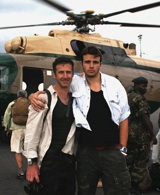 HN: Is the program primarily a behind-the-scenes look at intelligence gathering—a counterterrorism CSI, as it were—or is it more comparable to the show COPS, with terrorists instead of petty criminals? Or is it something else altogether?
HN: Is the program primarily a behind-the-scenes look at intelligence gathering—a counterterrorism CSI, as it were—or is it more comparable to the show COPS, with terrorists instead of petty criminals? Or is it something else altogether?
RDC: Altogether different. You’ll get little bits of everything, but this is a news show, it’s coming from NBC News. It’s not a “reality show” and it’s not fiction.
In its appearance, it looks almost like The Bourne Identity with its multiple camera angles, cameras following three guys around. You’ll witness meetings with state, local, and national officials around the world. There’s nothing else out there like this. It’s groundbreaking television.
HN: Once an episode of the show has said, “There’s this terrorist living openly in a certain country,” what’s the hook that will keep viewers tuned in for the rest of the hour?
RDC: The show follows a good format. Viewers are given a problem in the first few minutes. They’re going to say, “Oh, my gosh, this guy is doing this and getting away with it?” Then they join us on the journey to find him.
There’s no showboating, no vigilantism on the show; we work within the law to affect a good outcome. But you’ll see surveillance in which the operators are at risk. And some of the things that come out of the senior officials’ mouths will astound people. I don’t think viewers are even going to want to get up to get a beer.
The show is also presented in a very exciting style of very aggressive filming, like nothing else on TV. It’s unique and compelling.
HN: But there won’t be on-screen confrontations with known or alleged terrorists?
RDC: Oh, yes, there will be on-screen confrontations with bad guys. I don’t want to give away anything, but you’ll be absolutely stunned at how the first program ends. The SAS isn’t going to come in through the windows, but your jaw will be on the ground.
HN: Are you concerned about your safety?
RDC: That’s certainly a part of it. We’re choosing bad people, people who should be put away. To me this is something that needs to be done, it’s a higher cause. Good reporters go and talk to bad people around the world and come back and report on them. Journalists are taking the same risk, but you don’t generally see the Mexican drug cartels or others killing Reuters journalists.
With Army ops, after a mission your identity is cleansed so you can go back out there and perform more missions without being identified. With this show, we’re putting our identities out there. I may have to look over my shoulder for the rest of my life, but I understood that when I signed up for this show. I’m okay with that.
[continued on next page]




